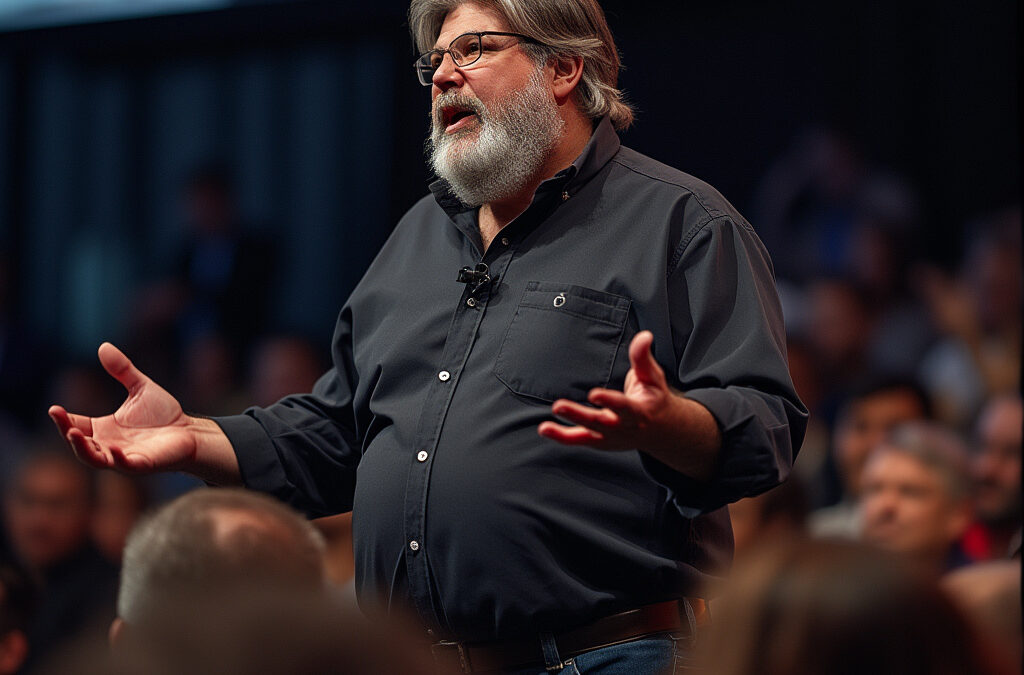Apple Co-Founder Steve Wozniak Criticizes DOGE and Elon Musk’s Management Style
In a recent tech conference, Apple co-founder Steve Wozniak openly criticized Elon Musk’s leadership of the Department of Government Efficiency (DOGE), likening his approach to a “sledgehammer” that undermines effective governance.
Wozniak acknowledged the need to address government inefficiencies but argued that DOGE’s sweeping cuts and mass firings are counterproductive. He emphasized the importance of a more surgical approach to reforms, prioritizing careful analysis over broad, indiscriminate reductions.
Mass Firings and Abrupt Leadership
Wozniak specifically criticized Musk’s management style, calling mass firings detrimental to business operations. He pointed to an email sent to federal employees, demanding they list five completed tasks or face termination, as an example of DOGE’s abrupt and heavy-handed tactics.
Accusations of Bullying and Poor Judgment
The Apple co-founder also accused Musk and former President Donald Trump of bullying, particularly in their treatment of Ukrainian President Volodymyr Zelenskyy. Wozniak, who has Ukrainian heritage, compared their behavior to schoolyard antics.
Wozniak questioned Musk’s judgment, suggesting that his wealth and success may have skewed his perspective. He warned that such unchecked confidence can lead to authoritarian decision-making, alienating others and stifling collaboration.
Dissatisfaction with Tesla and Suspected Ban from X
Despite owning several Tesla vehicles, Wozniak expressed frustration with the company’s evolution, particularly its user interface. He described the changes as progressively worse, making the interface “miserable” for users.
Additionally, Wozniak revealed he suspects he has been banned from X (formerly Twitter), which Musk owns, possibly due to his public criticisms of Tesla and its leadership.
Wozniak’s comments underscore growing concerns about the intersection of tech leadership and government roles, highlighting the need for a more nuanced and thoughtful approach to governance and reform.
Wozniak’s Critique Raises Questions About Tech Leaders in Government Roles
Steve Wozniak’s comments have sparked a broader debate about the role of tech industry leaders in government positions. While tech executives like Elon Musk are often praised for their innovation and problem-solving skills, Wozniak’s critique highlights the potential risks of applying corporate management styles to complex governance challenges.
The Risks of Corporate-Style Governance
Wozniak’s analogy of using a “sledgehammer” instead of a “scalpel” resonates with critics who argue that broad, sweeping changes can disrupt essential government functions. The mass firings and abrupt demands for task lists, as reported by DOGE, have raised concerns about employee morale and the long-term impact on institutional knowledge.
Empathy and Collaboration in Leadership
Wozniak’s accusations of bullying behavior, particularly toward Ukrainian President Volodymyr Zelenskyy, underscore the importance of empathy and diplomacy in leadership. He suggested that Musk and Trump’s approach to international relations reflects a lack of understanding of the complexities of global politics.
The Dangers of Unchecked Confidence
Wozniak’s warning about the dangers of wealth and success going to a leader’s head strikes a chord in the tech community. He implied that Musk’s confidence, while beneficial in building companies like Tesla and SpaceX, may not translate well to the nuanced world of governance, where collaboration and consensus-building are critical.
Tesla’s Evolution and the User Experience
Wozniak’s dissatisfaction with Tesla’s user interface highlights another issue: the balance between innovation and usability. While Tesla has been a pioneer in electric vehicles, Wozniak’s critique suggests that the company’s focus on cutting-edge technology may have come at the expense of user-friendliness.
The Broader Implications of Tech Leaders in Government
Wozniak’s comments also raise questions about the role of tech leaders in government. While their expertise can bring fresh perspectives, the transition from the private sector to public service requires a fundamentally different approach—one that prioritizes transparency, accountability, and the public good over profit and efficiency.
As the debate over DOGE’s approach continues, Wozniak’s critique serves as a reminder of the need for balance in governance reforms. The challenge for leaders like Musk is to find a middle ground that leverages the strengths of the tech industry while respecting the complexities and responsibilities of public service.
Conclusion
Steve Wozniak’s critique of Elon Musk’s management style at DOGE and his broader concerns about tech leaders in government roles highlight the challenges of applying corporate strategies to public service. While innovation and efficiency are crucial, Wozniak emphasizes the need for a more nuanced approach to governance—one that balances bold reforms with careful consideration, empathy, and collaboration.
The debate sparked by Wozniak’s comments underscores the importance of transparency, accountability, and the public good in government roles. As tech leaders like Musk continue to influence both the private and public sectors, the key will be finding a middle ground that leverages their innovative spirit while respecting the complexities of governance.
FAQ
Why did Steve Wozniak criticize Elon Musk’s management style?
Wozniak criticized Musk’s leadership at DOGE for being overly aggressive and counterproductive, likening it to using a “sledgehammer” instead of a “scalpel” for governance reforms.
What specific issues did Wozniak highlight about DOGE’s approach?
Wozniak pointed to mass firings, abrupt demands for task lists from federal employees, and a lack of careful analysis in decision-making, which he argued undermines effective governance.
Did Wozniak criticize Tesla as well?
Yes, Wozniak expressed dissatisfaction with Tesla’s evolving user interface, describing it as progressively worse and “miserable” for users.
What did Wozniak say about Musk’s behavior toward Ukrainian President Volodymyr Zelenskyy?
Wozniak accused Musk and former President Donald Trump of bullying, particularly in their treatment of Zelenskyy, comparing their behavior to schoolyard antics.
Why does Wozniak think Musk’s confidence may be problematic?
Wozniak warned that Musk’s wealth and success may have skewed his perspective, leading to authoritarian decision-making and stifling collaboration in governance roles.
What are the broader implications of Wozniak’s critique?
Wozniak’s comments raise questions about the role of tech leaders in government, emphasizing the need for a balance between innovation and the responsibilities of public service, including transparency, accountability, and empathy.

